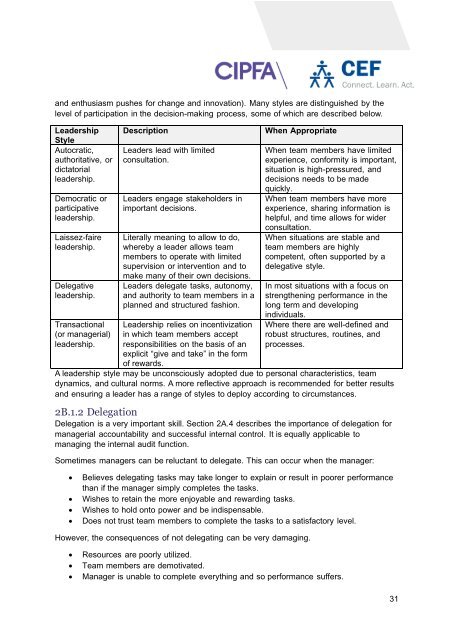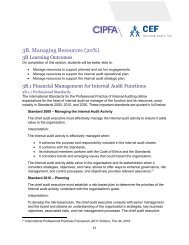TIAPS ALB_Module 2B. Managing People
- No tags were found...
Create successful ePaper yourself
Turn your PDF publications into a flip-book with our unique Google optimized e-Paper software.
and enthusiasm pushes for change and innovation). Many styles are distinguished by the<br />
level of participation in the decision-making process, some of which are described below.<br />
Leadership<br />
Style<br />
Autocratic,<br />
authoritative, or<br />
dictatorial<br />
leadership.<br />
Democratic or<br />
participative<br />
leadership.<br />
Laissez-faire<br />
leadership.<br />
Delegative<br />
leadership.<br />
Transactional<br />
(or managerial)<br />
leadership.<br />
Description<br />
Leaders lead with limited<br />
consultation.<br />
Leaders engage stakeholders in<br />
important decisions.<br />
Literally meaning to allow to do,<br />
whereby a leader allows team<br />
members to operate with limited<br />
supervision or intervention and to<br />
make many of their own decisions.<br />
Leaders delegate tasks, autonomy,<br />
and authority to team members in a<br />
planned and structured fashion.<br />
Leadership relies on incentivization<br />
in which team members accept<br />
responsibilities on the basis of an<br />
explicit “give and take” in the form<br />
of rewards.<br />
When Appropriate<br />
When team members have limited<br />
experience, conformity is important,<br />
situation is high-pressured, and<br />
decisions needs to be made<br />
quickly.<br />
When team members have more<br />
experience, sharing information is<br />
helpful, and time allows for wider<br />
consultation.<br />
When situations are stable and<br />
team members are highly<br />
competent, often supported by a<br />
delegative style.<br />
In most situations with a focus on<br />
strengthening performance in the<br />
long term and developing<br />
individuals.<br />
Where there are well-defined and<br />
robust structures, routines, and<br />
processes.<br />
A leadership style may be unconsciously adopted due to personal characteristics, team<br />
dynamics, and cultural norms. A more reflective approach is recommended for better results<br />
and ensuring a leader has a range of styles to deploy according to circumstances.<br />
<strong>2B</strong>.1.2 Delegation<br />
Delegation is a very important skill. Section 2A.4 describes the importance of delegation for<br />
managerial accountability and successful internal control. It is equally applicable to<br />
managing the internal audit function.<br />
Sometimes managers can be reluctant to delegate. This can occur when the manager:<br />
• Believes delegating tasks may take longer to explain or result in poorer performance<br />
than if the manager simply completes the tasks.<br />
• Wishes to retain the more enjoyable and rewarding tasks.<br />
• Wishes to hold onto power and be indispensable.<br />
• Does not trust team members to complete the tasks to a satisfactory level.<br />
However, the consequences of not delegating can be very damaging.<br />
• Resources are poorly utilized.<br />
• Team members are demotivated.<br />
• Manager is unable to complete everything and so performance suffers.<br />
31
















